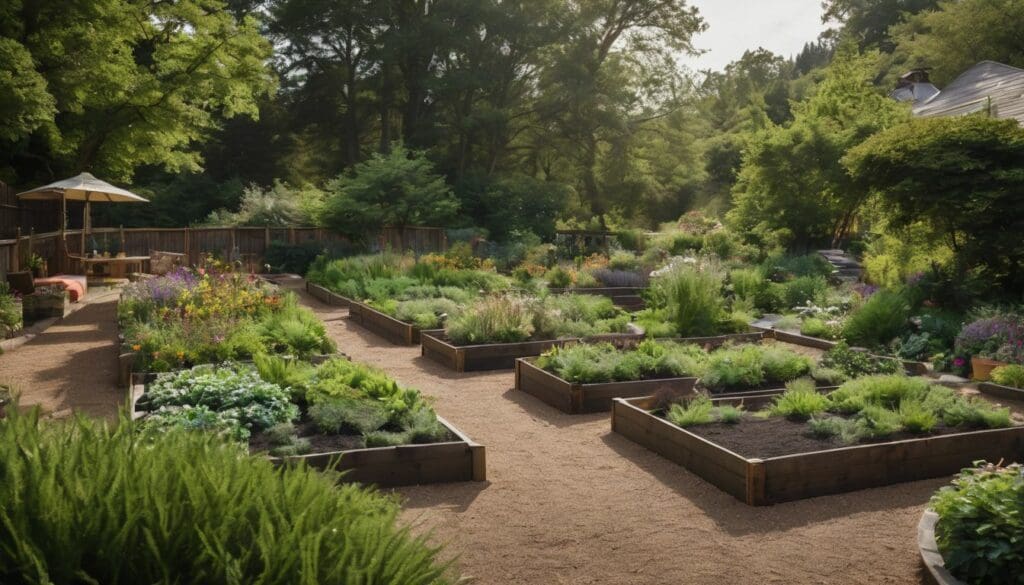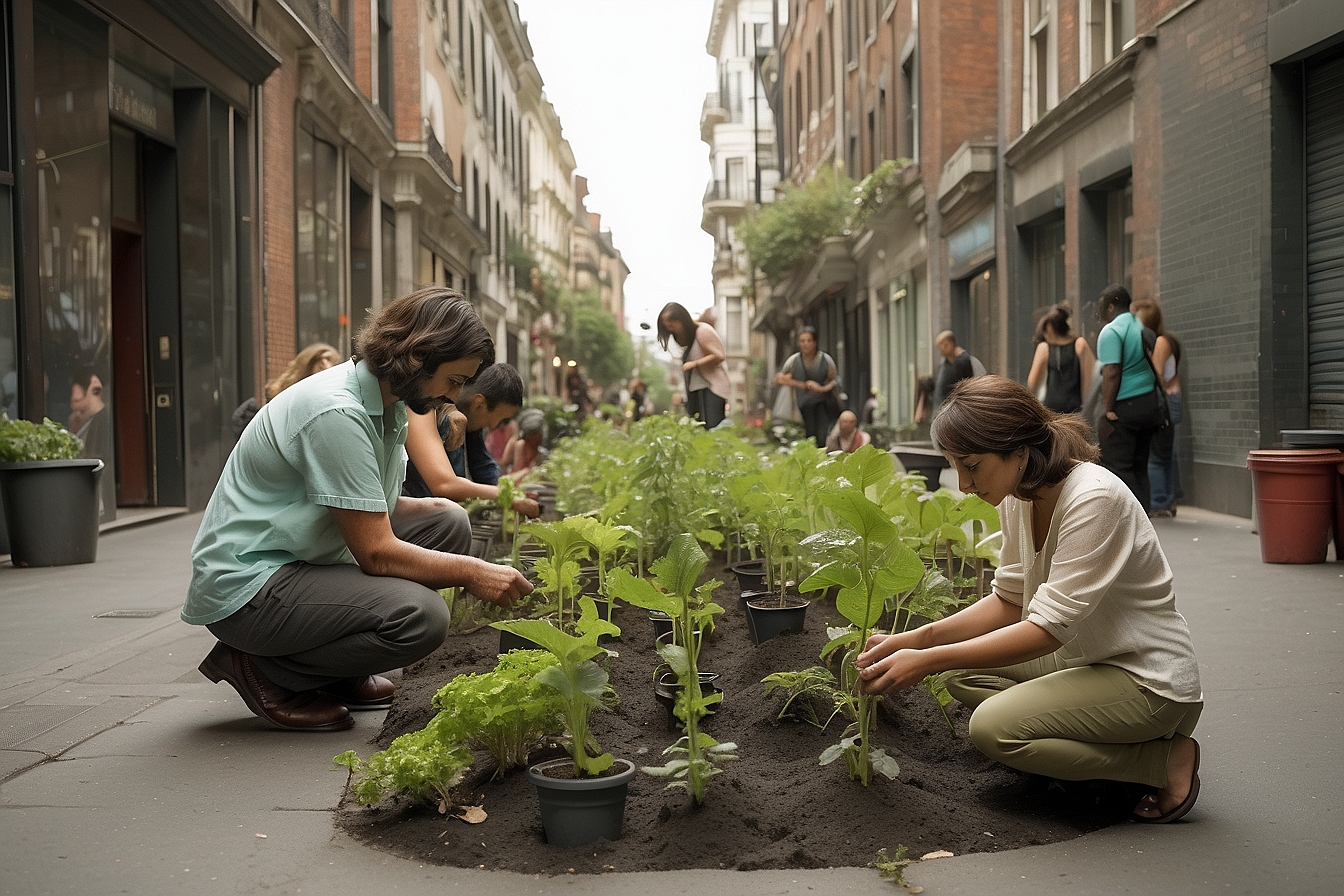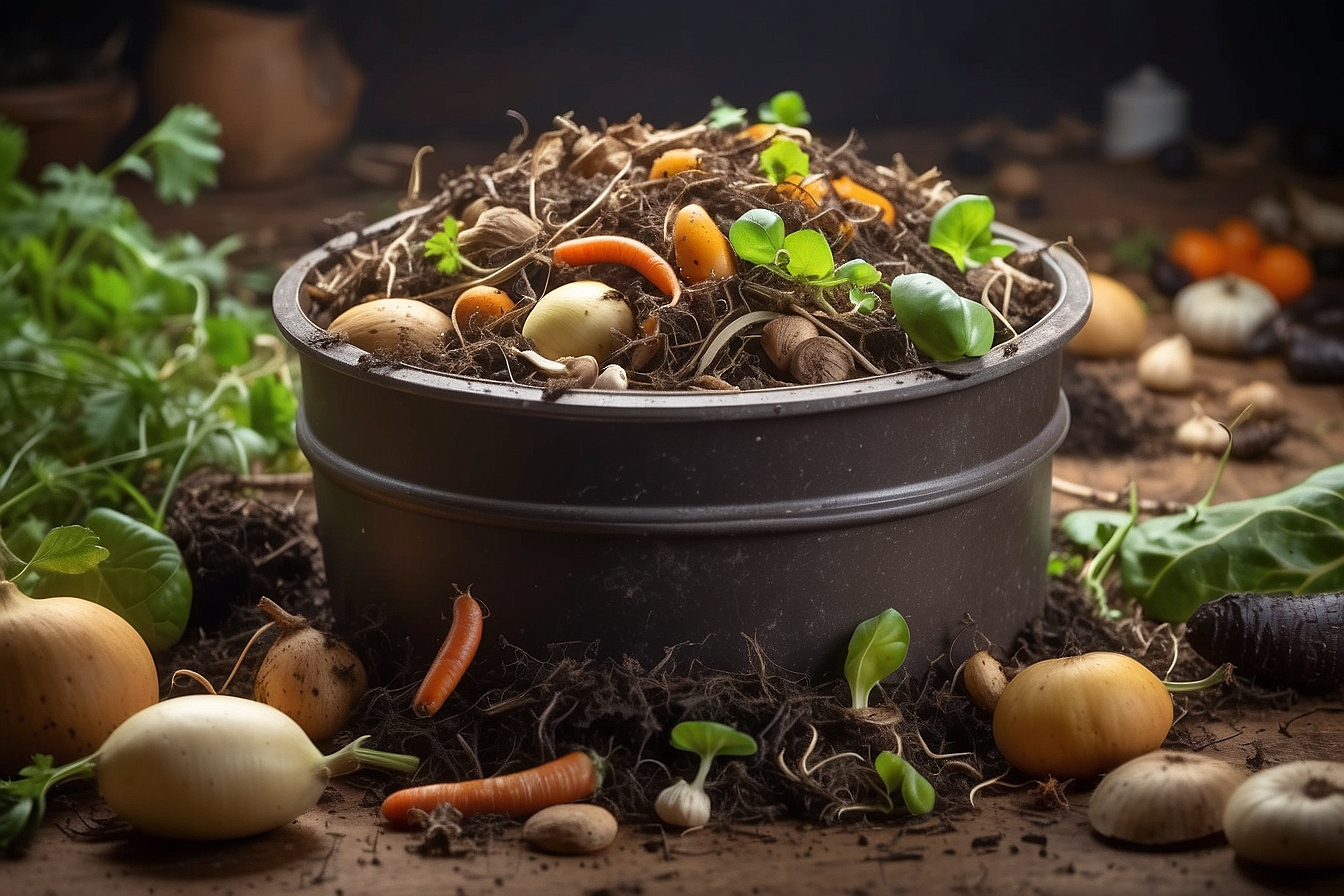Ah, the perennial battle with those pesky weeds – an all-too-familiar scenario for those of us who take pride in our little slice of green tranquility. Like a thorn in one’s side, these unwelcome guests seem to have made a pact to test our resolve.
Having rolled up our sleeves and delved into the nitty-gritty of horticultural research, we’ve unearthed a rather startling statistic: approximately 70% of weed seeds show remarkable tenacity by lingering in the soil for around six or more years! With a spirit of camaraderie among fellow enthusiasts of the trowel and spade, we’re thrilled to share some natural tactics that are not only effective but also kind to our cherished planet.
So let’s put on our gardening gloves and bid farewell to those irksome invaders once and for all!
Key Takeaways
- Use organic mulches like straw and wood chips to suppress weeds by blocking sunlight and maintaining soil moisture, while also enriching the soil as they decompose.
- Try alternatives to synthetic herbicides such as boiling water, white vinegar, or lemon juice for an eco-friendly way to eliminate weeds without damaging the environment.
- Flame weeders offer a chemical-free method for controlling weeds using heat; it’s effective in hard-to-reach areas but requires careful handling to ensure safety.
- Cornmeal gluten prevents weed seeds from germinating and doubles as a nitrogen – rich fertiliser; apply it early in spring before weeds start growing.
- Solarising with clear plastic tarps uses the sun’s heat to kill off weed seeds and root systems over several weeks, offering a non-toxic solution for weed control.
Why Use Natural Weed Control?
Chemical herbicides can harm the environment and pose health risks, making natural weed control a safer alternative. In addition, natural methods promote soil health and biodiversity, benefiting the overall ecosystem.
Harmful effects of chemical herbicides
We acknowledge the damaging impact chemical herbicides have on our environment, which is why we’re turning to natural weed control techniques. These chemicals seep into the soil, contaminate water supplies and can cause harm to wildlife.
They disrupt ecosystems and can lead to a decline in beneficial insect populations like bees. Moreover, their residue may linger on produce, posing potential health risks to humans.
Our concern extends to the long-term effects these products often have on soil health. Constant use of synthetic herbicides can degrade soil structure and decrease its fertility over time.
This results in an increased dependency on artificial fertilisers, creating a vicious cycle that harms our planet’s delicate balance. We advocate for sustainable weed management as part of adopting eco-friendly gardening practices that protect the earth for future generations.
Benefits of natural methods
Natural weed control methods offer several benefits that align with our eco-conscious values. These techniques minimise the harmful effects of chemical herbicides, ensuring environmentally safe and sustainable weed prevention.
Furthermore, organic weed control methods promote healthy soil and support conservation, contributing to a greener environment.
Implementing natural pest control methods supports our commitment to eco-friendly practices and reduces our reliance on chemical-based solutions. By embracing natural weed eradication techniques such as mulching, hand pulling weeds, and using organic herbicide alternatives like boiling water or vinegar, we actively contribute to a healthier ecosystem while maintaining aesthetically pleasing landscapes without compromising environmental safety.
Methods for Hand Pulling and Hoeing
When it comes to natural weed control, hand pulling and hoeing are effective methods for removing weeds without the use of chemicals. By using the right tools and techniques, you can easily maintain a weed-free garden or lawn.
Tools to use
We need the right tools for effective hand pulling and hoeing. A sturdy pair of gloves and a long-handled hoe is crucial. The gloves protect our hands, while the hoe helps us to dig deep and remove weeds from the root level.
These tools are essential for ensuring thorough weed removal without causing harm to ourselves or the environment.
As we embrace natural weed control techniques, adopting proper tools ensures that we can efficiently maintain a chemical-free garden or landscape. Using high-quality equipment supports our commitment to environmentally safe weed management and contributes to sustainable gardening practices.
Best practices
To ensure effective natural weed control, it is essential to follow these best practices:
- Choose the right time for hand pulling and hoeing to minimise weed regrowth.
- Properly sharpen and maintain tools such as hoes and trowels for efficient weed removal without damage to surrounding plants.
- Apply organic herbicides in the early morning or late afternoon when weeds are most susceptible.
- Use mulching materials that are free from weed seeds and lay them at an adequate depth to suppress weed growth effectively.
- Monitor the moisture levels in your mulch to prevent weed growth while still supporting plant health.
- Rotate natural weed control methods regularly to discourage the development of resistance in weeds.
- Be diligent in applying any chosen method consistently for long – term effectiveness.
Organic Herbicide Alternatives
Discover eco-friendly alternatives to chemical herbicides such as boiling water, white vinegar, and lemon juice. These natural herbicide options are effective in controlling weeds without harming the environment.
Boiling water
Boiling water is a simple yet effective way to tackle weeds. When poured directly onto the unwanted plants, it scalds and destroys them down to the roots. This method is particularly useful for clearing weeds from paths or driveways as it doesn’t harm surrounding soil or wildlife.
Boiling water can be used repeatedly, making it a cost-effective and environmentally friendly weed control solution.
Using boiling water fits in perfectly with nontoxic weed control methods, eliminating the need for harmful chemical herbicides. It’s an easy and accessible option for those who want to maintain a chemical-free garden space while effectively managing unwanted plant growth.
White vinegar
White vinegar is an effective natural herbicide that can be used to kill weeds. Its high acidity helps to destroy the plant’s cell structure, making it a potent and eco-friendly weed control solution.
When applied directly to the unwanted plants, white vinegar penetrates the leaves and stems, causing them to wither and die. It is important to note that using white vinegar as a weed killer should be done cautiously as it can also affect surrounding vegetation due to its non-selective nature.
When considering natural alternatives for weed control in your garden or yard, white vinegar presents itself as a viable option due to its effectiveness and minimal impact on the environment.
Lemon juice
Lemon juice, a common kitchen ingredient, can also serve as a natural weed killer. Its high acidity levels make it effective in killing off unwanted plants and weeds. When sprayed directly onto the leaves of weeds, the citric acid in lemon juice breaks down the plant’s cell walls, leading to their demise.
In addition to its weed-killing properties, using lemon juice as an organic herbicide offers an environmentally safe alternative to chemical products. The impact on soil health is minimal compared to synthetic herbicides which can harm beneficial microorganisms and disrupt the ecological balance of the soil.
Overall, incorporating lemon juice into your arsenal of natural weed control methods provides an eco-friendly approach that aligns with sustainable gardening practices.
Mulching and Ground Covers
Mulching and ground covers are effective natural weed control methods that help suppress weeds by blocking sunlight and preventing their growth. Different types of mulch and ground covers, such as straw, wood chips, and landscape fabric, can be used to create a barrier against weeds in the garden.
Types of mulch and ground covers
Mulching helps control weeds in the environment. Different types of organic mulch can help suppress weed growth and conserve soil moisture. Some common organic mulches include straw, wood chips, and shredded leaves. In addition to traditional mulch, ground covers such as clover or creeping thyme provide an effective barrier against weed growth. These options not only minimise weeds but also enrich the soil as they decompose. Some other choices to consider are grass clippings and newspaper mulch. Each type offers unique benefits while effectively suppressing weed growth.
- Straw: Adds nutrients to the soil as it decomposes.
- Wood chips: Provides long-lasting weed suppression and enhances soil health.
- Shredded leaves: Improves soil structure and fertility while reducing weed growth.
- Clover: Acts as a living mulch, preventing weeds from establishing while adding nitrogen to the soil.
- Creeping thyme: Forms a dense mat that inhibits weed germination and adds aesthetic appeal.
- Grass clippings: Helps to suppress weeds while recycling nutrients back into the soil.
- Newspaper mulch: Creates a barrier against light, preventing weed seed germination while biodegrading over time.
How they suppress weeds
Mulching and ground covers suppress weeds by blocking sunlight and preventing weed seeds from germinating. This method also maintains soil moisture, which supports healthy plant growth while simultaneously inhibiting weed development.
Additionally, mulch nourishes the soil as it breaks down over time, creating a healthier growing environment for plants.
Ground covers act in a similar way to mulch by forming a physical barrier that impedes weed growth. They are effective at smothering existing weeds and preventing new ones from emerging.
Other Natural Weed Control Methods
Solarising involves using the sun’s heat to kill weed seeds and root systems. Cornmeal gluten can be used as a natural pre-emergent herbicide to prevent weed seed germination. Additionally, flame weeders use high temperatures to eliminate weeds without chemicals.
Solarising
To kill weeds naturally, we practice solarising by covering the soil with a clear plastic tarp. The sun heats the soil, killing weed seeds and seedlings beneath the tarp over several weeks.
This method reduces the need for chemical herbicides and is an environmentally safe option for controlling weeds in gardens and landscapes.
The process involves preparing the area, laying down a transparent plastic tarp, anchoring it to prevent wind from lifting it, and leaving it in place for at least 4-6 weeks during warm weather.
Cornmeal gluten
After solarising the soil, another effective natural weed control method is using cornmeal gluten. This byproduct of milled corn is rich in nitrogen and acts as a pre-emergent herbicide that inhibits weed seed germination while providing nourishment to the soil.
Simply apply the cornmeal gluten over your garden beds or lawn, and water it in well to activate its weed-suppressing properties. It’s important to note that cornmeal gluten only prevents weed seeds from sprouting, so it won’t eliminate existing weeds.
Cornmeal gluten works best when applied in early spring before weeds have had a chance to grow. By incorporating this eco-friendly method into your gardening routine, you can naturally prevent weeds from taking over your outdoor spaces while enriching the soil with essential nutrients.
Flame weeders
Flame weeders are effective tools for environmentally safe weed control. These devices use heat to kill weeds without the need for harmful chemicals. Propane-fueled flame weeders work by directing a high-temperature flame at unwanted plants, causing them to wither and die.
This method is particularly useful for targeting weeds in areas where hand pulling or hoeing may be difficult, such as in between paving stones or along fences.
Using flame weeders requires caution and proper technique to avoid accidentally damaging nearby plants or starting fires. It’s important to follow safety guidelines and use this tool responsibly in an eco-conscious approach to managing unwanted vegetation.
Conclusion
In conclusion, natural weed control techniques offer a safe and eco-friendly alternative to chemical herbicides. Hand pulling and hoeing provide effective methods for removing weeds without harming the environment.
Additionally, organic herbicide alternatives such as boiling water, white vinegar, and lemon juice can be used as powerful yet non-toxic weed killers. Mulching and ground covers not only suppress weed growth but also enrich the soil.
Other methods like solarising and using cornmeal gluten or flame weeders are innovative ways to manage weeds in an environmentally friendly manner.
FAQs
1. What are natural weed control techniques?
Natural weed control techniques include using homemade weed killers, soil mulching, and other chemical-free methods to manage unwanted plants in your garden.
2. Can I make a homemade weed killer that is eco-friendly?
Yes, you can create an eco-friendly vinegar weed killer or use salt for non-toxic weed management right at home.
3. Is it possible to control weeds without harming the environment?
Absolutely! By using organic gardening techniques and DIY weed control remedies, you keep your garden green without resorting to harsh chemicals.
4. Are there ways to suppress weeds naturally?
Indeed, biological weed suppression involves using living organisms or nonchemical means like hand-pulling to eliminate weeds effectively while being environmentally conscious.
5. How do I eradicate weeds from my garden using green methods?
Ecoconscious eradication of weeds can be achieved through practices like mulching or employing nontoxic solutions such as salt and vinegar for long-term results in your organic garden.





